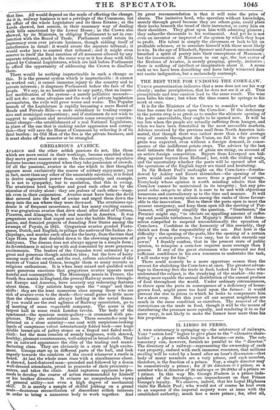THE BEST TIME FOR UNDOING THE CORN-LAW. UNDUE procrastination indicates
that a man does not see his way clearly ; undue precipitation, that he does not see it at all. True promptitude and true caution lead to the same result. The wise man bides his time ; but when the time comes he springs to his mark at once.
It is for the Ministers of the Crown to consider whether the time has come for action upon the Corn-law. If the deficiency in the potato crop is so great as to render the ultimate opening of the ports unavoidable, they ought to be opened now. It will be too late when the people are actually suffering from hunger, and when we have been forestalled in the most accessible markets. Advices received by the previous mail from North America inti- mated, that though there was rather more than a fair average crop of cereals throughout the Union, no fall in the prices of grain was expected, even without a foreign demand, in conse- quence of the indifferent potato crops. The advices by the last mail intimate that the prices of grain are rising, on account of an active foreign competition. Buyers from Liverpool are bid- ding against buyers from Holland ; but, with the sliding scale, and the uncertainty whether the ports will be opened after all, the operations of the English buyer are timid and hesitating. In Sir Robert Peel's onslaught on the Corn-laws—foresha- dowed by Ashley and Escott skirmishes—the opening of the ports would enable him to move from a ground of vantage. Everybody whose opinion is worth minding admits that the Corn-law cannot be maintained in its integrity; but any pro- posal rebus integris to alter it is sure to be met with objections numerous and contradictory as to the time and manner. It will be so many men so many minds among the ranks of those favour- able to the innovation. But to throw the ports open to Meet the present emergency, and keep them open till the meeting of Par- liament, will greatly simplify the question. "Gentlemen," the Premier might say, "to obviate an appalling amount of suffer- ing and possible turbulence, her Majesty's Ministers felt them- selves compelled to suspend unconditionally the operation of Corn-laws. Confident in the humanity of this assembly, they shrink not from the responsibility of the act. But here is the difficulty : the opening of the ports, like the opening of a certain gate by a certain portress, was easy, but to shut exceeds our power.' I frankly confess, that in the present state of public opinion, to reimpose a corn-law requires more courage than I possess. If any of the great statesmen who surround me feel sufficient confidence in his own resources to undertake the task, I will make way for him." There could scarcely be a more opportune season than the present for abolishing the Corn-laws at once. The greatest advan- tage in throwing- free the trade in food, looked for by those who understand the subject, is the steadying of the market—the ren- dering more equable the annual distribution of the annual produce of food throughout the world. Under ordinary circumstances, to throw open the ports in consequence of a deficiency of home- grown food, might press too hard upon the farmer : it would prevent the rise in prices to which he looks to compensate him for a short crop. But this year all our nearest neighbours are much in the same condition as ourselves. The removal of the restrictions on the trade in food, though it will be the means of distributing the pressure more equally, and rendering it in so far more easy, is not likely to make the farmer bear more than his fair proportion.


























 Previous page
Previous page